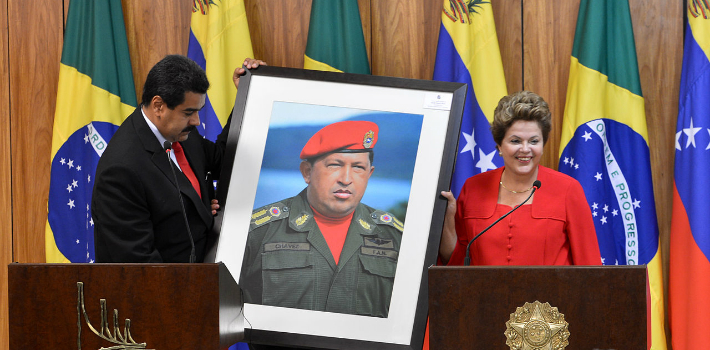EspañolSince 2003, when Luiz Inácio Lula da Silva took office as president of Brazil, and under his successor Dilma Rousseff, commercial and diplomatic relations with Chavista Venezuela have been positive and close. The pair have been vital strategic partners, despite the undeniable political differences between both their governments.
These differences can be seen clearly in their foreign policies. In contrast with the ones implemented by Hugo Chávez and Nicolás Maduro, marked by their ideological bias, those favored by Lula and Rousseff have been more pragmatic; they are mainly based on economic interests and their traditional geo-strategic objective, to consolidate themselves as a regional and global power.
This explains Brazil’s friendly but conditional stance towards Venezuela during the Chavista regime. In fact, Brazilians have always refused to join the Bolivarian Alliance for the Peoples of our America (ALBA). It also explains why their bilateral relations, which had a golden era during Lula da Silva’s eight-year mandate, are now, under Dilma Rousseff, undergoing a subtle decline. This divide may deepen in the future due to the economic crisis and the political instability of Nicolás Maduro’s administration.
We should recall that it was in 2005, with Lula, when the “strategic alliance” was truly signed between Brasília and Caracas. Officials initiated agreements on a wide array of matters, quarterly meetings, and a cooperation facility. As these links strengthened, a very privileged partnership arose, which brought about an 858 percent increase in Brazilian exports to Venezuela. According to the Venezuelan Ministry of Foreign Affairs, total Brazil-Venezuela trade grew seven-fold from 2003 to 2012.
Regarding politics and diplomacy, though, President Lula signaled his distance from Chávez’s stance in matters that compromised Brazilian interests. For instance, during confrontations between the Commandante and George W. Bush’s administration in the United States and with the Colombian Álvaro Uribe, Lula acted as mediator or an appeaser with Chávez.
Still, Lula’s support for Chávez afforded the Venezuelan president international legitimacy. He did so through action or omission, sometimes with complicit silence, sometimes in a direct way or through his minister of foreign affairs, Celso Amorin, or his adviser Marco Aurelio García, who were in charge of his foreign policy.
With Lula’s successor, Dilma Rousseff, those fruitful bilateral relations have continued. Venezuela still accounts for 15 percent of Brazil’s total trade surplus. In 2012, their bilateral trade reached a record US$6.1 billion — although it favored Brazil steeply, where 80 percent of the traded goods and services came from. The energy sector accounted for Venezuela’s 20 percent (state-led).
Russeff and Maduro too have a cordial relationship. One of the Venezuelan president’s first visits this year, after his dubious electoral win, was to Brazil — and Brazil was one of the first countries to offer diplomatic acknowledgement. During the meeting, both leaders committed to sustaining their alliance and signed new agreements. Later, Brazilian authorities ensured that they would help Venezuela overcome the serious shortages it is currently experiencing.

Source: Agência Brasil
Nevertheless, neither commercial nor diplomatic relations have been quite the same as those between Lula and Chávez. A political distancing and higher commercial pragmatism can be seen. Rousseff, more than Lula, acts on her own interests, which are those of an emerging power. Therefore, her stance changes according to the circumstances she faces. And she has critical internal issues to deal with — public demonstrations, popular unrest, partisan divisions, economic recession, etc. — although these are not as acute as those faced by her Venezuelan counterpart.
The disastrous economic situation in Venezuela is also a factor in Russeff’s growing apart. It was why, on October 28, she sent a mission to Caracas led by her minister of commerce and industry, Fernando Pimentel. He intended to claim the repayment of debts incurred by Venezuelan state firms with Brazilian exports companies, mainly in the food sector. According to the Folha de Sao Paulo newspaper, many payments of exports from Brazilian companies this year are already four months late.
Brazil’s subtle distancing is also due to the militarization and radicalization of Maduro’s administration. Rousseff and her Workers’ Party (Partido dos Trabalhadores) are in a pre-electoral campaign period for the 2014 presidential elections, and her reelection is at stake. Therefore, she has no wish to be seen as having a close relationship with an undemocratic government that openly attacks the Constitution, the democratic opposition, and the rights of its citizens, including freedom of speech and information. Rousseff has repeatedly said that she prefers “the noise of newspapers to the silence of dictatorships.”
After all, Brazil is aware that it enjoys a democracy in which the media have a vigilant role and, in general terms, respect the democratic principles and institutions, plurality of voices, and human rights. It is also aware of its key status in South America — hence the caution against Maduro’s Chavismo. It is, after all, debased not only economically but also politically in the hemisphere and has long ceased to be the epicenter of the Latin American left.
Translated by Ceteris-Paribus.
 Versión Español
Versión Español












